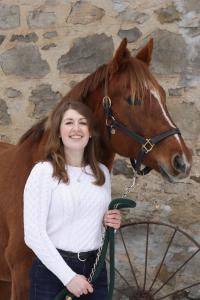 |
Caleigh CopelinPosition/Title: PhD Candidate email: ccopelin@uoguelph.ca Phone: Office:
|
Education and Research Background
I graduated from the University of Guelph in 2022 with a Bachelor of Bio-Resource Management majoring in Equine Management. I am now working on my PhD with Dr. Katrina Merkies, focusing on equine behaviour and welfare. I began working in Dr. Merkies’ lab in 2020 as an undergraduate research assistant, and I have been involved with her lab ever since! My research projects are primarily related to equitation science – the study of the relationship between horses and humans, and how our management and training decisions can impact them.
Focuses of Previous Research Projects
- The Canadian equine industry’s response to the COVID-19 pandemic
- The use of blindfolds to improve handling of horses in dangerous or stressful situations
- The use of tack and equipment in sale ads for horses
- Characterizing the role of granular lymphocytes in mild equine asthma
- A project done in collaboration with Equestrian Canada to analyze the results of their noseband measuring pilot study performed in the summer of 2021
- Creating an in vitro model of equine digestion
Current Research
I have worked with horses for my whole life, and with my graduate research, I really wanted to be able to give back to these animals that have given me so much. I am a recipient of an NSERC Canada Graduate Scholarship for this work, which has given me the ability to create a thesis project on a subject that is very near to my heart – the welfare of riding lesson horses.
Riding lesson horses are the foundation of the Canadian equine industry, serving as the entry point for many beginner riders. However, most equine behaviour and welfare research does not focus on the unique stressors that lesson horses face. Lesson horses have been reported to have poorer welfare compared to other types of horses in the industry and tend to have more pessimistic outlooks towards life. These horses do not have an easy job, as they are constantly adapting to new riders and handlers, many of whom may be beginners who give conflicting cues that can be uncomfortable to these horses. With my project, I hope to create a better understanding of the state of lesson horse welfare in Canada. There has been very little research done previously in this area. My project will serve to create a baseline understanding of the specific challenges that lesson horses are facing. In turn, this data can be used to target areas for further research and improved education. I will be using a combination of survey data and in-barn assessments of working lesson horses to identify husbandry practices (such as housing style, feeding regime, equipment used, workload) that may reduce the level of stress that these horses experience during riding lessons.
Publications
Copelin C, Hayman B, Bergeron R, Merkies K. 2024. Compliance or Confusion? The usefulness of blindfolding horses as a handling technique. Applied Animal Behaviour Science 271(3):106180. doi:10.1016/j.applanim.2024.106180.
Merkies K, Copelin C, Small N, Young J. 2022. Noseband fit: Measurements and perceptions of Canadian equestrians. Animals 12:2685. doi:10.3390/ani12192685.
Merkies K, Copelin C, Crouchman E, St-Onge A. 2020. The Effect of the COVID-19 Pandemic on Riding Lesson Barns and Summer Camps in Ontario. Animals. 10(12):2412. doi: 10.3390/ani10122412.
Merkies K, Copelin C, McPhedran C, McGreevy P. 2022. The presence of various tack and equipment in sale horse advertisements in Australia and North America. Journal of Veterinary Behavior. 55-56:63-70. doi: 10.1016/j.jveb.2022.07.010.
For more research, check out some of the incredible work being done by my colleagues in Dr. Merkies’ lab:
Amir Sarrafchi (equine and canine)


